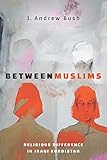Between Muslims : religious difference in Iraqi Kurdistan / J. Andrew Bush.
Material type: TextSeries: Stanford studies in Middle Eastern and Islamic societies and culturesPublisher: Stanford, California : Stanford University Press, [2020]Description: 1 online resource (xv, 216 pages)Content type:
TextSeries: Stanford studies in Middle Eastern and Islamic societies and culturesPublisher: Stanford, California : Stanford University Press, [2020]Description: 1 online resource (xv, 216 pages)Content type: - 9781503614598
- 150361459X
- Muslims -- Religious life -- Iraq -- Kurdistān
- Islam -- Iraq -- Kurdistān -- Customs and practices
- Irreligion -- Iraq -- Kurdistān
- Islamic ethics -- Iraq -- Kurdistān
- Kurds -- Iraq -- Kurdistān -- Religion
- Kurdistān (Iraq) -- Religious life and customs
- Religious life -- Islam
- Vie religieuse -- Islam
- Islam -- Irak -- Kurdistān -- Coutumes et pratiques
- Irréligion -- Irak -- Kurdistān
- Morale islamique -- Irak -- Kurdistān
- Kurdes -- Irak -- Kurdistān -- Religion
- SOCIAL SCIENCE / Islamic Studies
- Irreligion
- Islam -- Customs and practices
- Islamic ethics
- Kurds -- Religion
- Muslims -- Religious life
- Iraq -- Kurdistān
- Ethics
- Ethnography
- Gender and Family
- Iraq
- Islam
- Islamism
- Kurdistan
- Poetry
- Sufism
- 297.09567/2 23
- BP63.I72 B87 2020
- online - EBSCO
| Item type | Current library | Call number | URL | Status | Notes | Barcode | |
|---|---|---|---|---|---|---|---|
 eBook
eBook
|
Biblioteca "Angelicum" Pont. Univ. S.Tommaso d'Aquino Nuvola online | online - EBSCO (Browse shelf(Opens below)) | Online access | Not for loan (Accesso limitato) | Accesso per gli utenti autorizzati / Access for authorized users | (ebsco)2584585 |
Includes bibliographical references and index.
Introduction : fieldwork in Kurdistan : paradox, ordinary relationships, and Islamic traditions -- Qur'an and Zoroaster : authority and attraction in Muslim ethics -- Christians, kafirs, and nationalists in Kurdish poetry -- Mystical desire, ordinary desire : love, friendship, and kinship -- Separating faith and kufir in an Islamic society -- Pleasure beyond piety : religious difference in domestic space -- Epilogue: "Dear reader!"
"This book asks what it means to be Muslim, yet not pious, in Iraqi Kurdistan. Though Islam is often represented in terms of either daily devotion, such as prayer and fasting, or abandonment of faith, there are many who turn away from tradition without departing from Islam. J. Andrew Bush offers us a new way to understand religious difference in Islam, one that invites questions about divine texts and rejects easy answers about political or sectarian identities. Exploring the lives of irreligious Muslims, Bush highlights the paradoxes of their ethical orientation. While profoundly averse to many aspects of Islamic traditions, irreligious Muslims nonetheless harbor attractions to other aspects--such as Sufi poetry. Exploring this complex weave of attraction and aversion, Relating to Islam in Kurdistan provides intimate portraits of irreligious Kurdish Muslims in everyday life and the historical conditions that have allowed such paradoxical religious orientations to appear very ordinary in contemporary Kurdistan. Whether readers approach the book as Muslims with a commitment to Islam, or as Muslims with ambivalence to Islam, or as non-Muslims who bear their own forms of certainty or ambivalence about Islam, the book will open to the door to thinking about the relationship between commitment and ambivalence in Islamic traditions"-- Provided by publisher.
Description based on online resource; title from digital title page (viewed on September 03, 2020).
In English.


